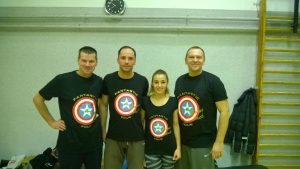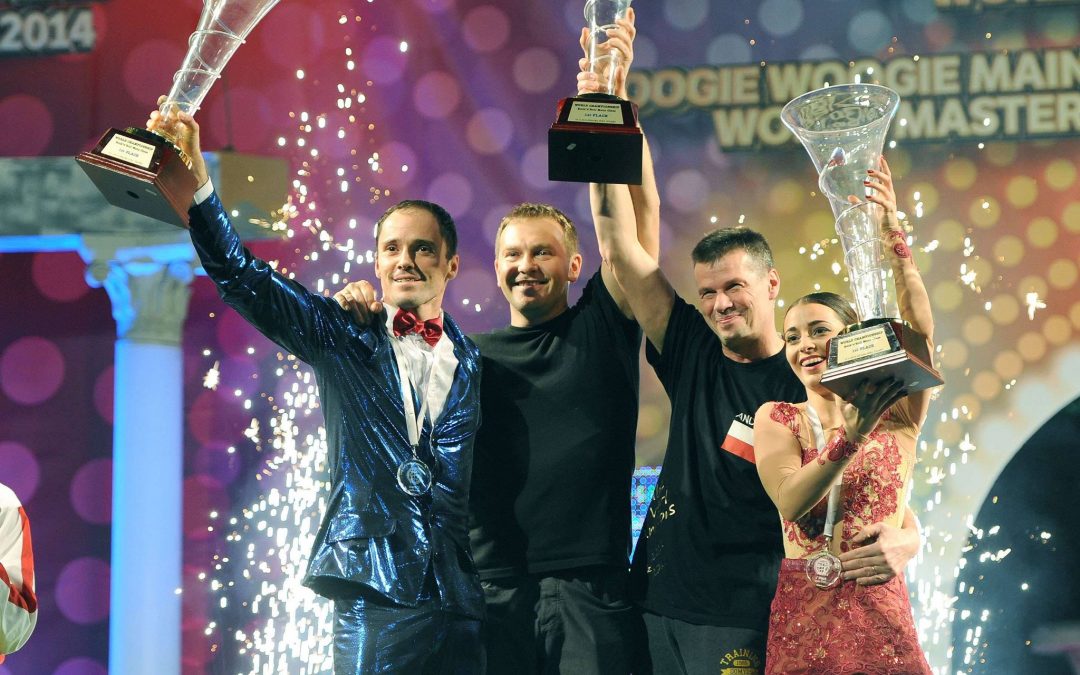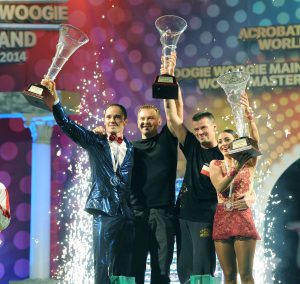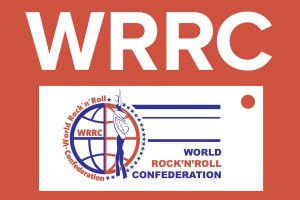Meet Bartlomiej Kobylanski, WRRC Vice-President and a 4x MC World Champion coach from Poland.

Read the interview with the legendary Rock’n’Roll coach and dancer to get to know what objective, basic aspects and secret weapons exist in coaching and learn 12 pieces of advice for coaches.
What does coaching mean to you?
Sport has undergone considerable changes over the last 20 years and so has coaching. Once result-only oriented, now well-executed coaching proves to deliver more concrete results than it did in the past.
Therefore, I see coaching as well-thought-out, carefully planned and systematically developed actions aimed at forming a happy person of value. I regard the training process as a long-term development of an athlete/dancer, where the new challenges that he or she is presented with correspond to their current stage of development. Particular stages of biological development are not to be transgressed because quick success and the dancer’s remarkable skills may be demonstrative more of the coach’s effort than the young sportsperson’s conscious participation.
In Rock’n’Roll coaching is very difficult and therefore interesting. It is an exceptional and amazingly versatile sport that combines two basic aspects: physicality and mentality.
- In Rock’n’Roll physicality must combine all motor skills (jumping ability, strength, balance, flexibility [agility]) at a high level. None of these can be neglected. Sports coaching is aimed at developing one’s motor skills, but not through a series of monotonous repetitions and movements (even though they bring the quickest results at competitions). Training programs in athletics, gymnastics and sports games are likely to bring the expected long-term effects, yielding a healthy, physically fit athlete, one that is willing to constantly improve his or her skills.
This is where we encounter the perennial problem in Acrobatic Rock’n’Roll, namely how to prepare a girl for junior competition, where she will perform somersaults? If she does not start at the age of 8 or 9, later it will only be harder. If elements of acrobatics are not introduced to the training program at an early age, the chances of ever raising an MCFS competitor are very low. This is what makes RR coaching so interesting. If, as a coach, you focus solely on high dancing skills through constant RR repetitions and if you become result-only oriented, then you will not have time for your sportsmen’s long-term development.
Another option is to win a former acrobat or gymnast over to MCFS. This, however, raises other issues because we do not have influence on such a sportperson’s long-term development and we do not know what problems we will have to face.
This was exactly Ania and Jacek’s case. Ania was a successful acrobat and Jacek used to play football. Having a couple of very fit and technically skilled athletes allowed me as a coach to consider entering the area of sport at a professional level. They were not bored with rock’n’roll and derived a lot of fun from learning increasingly difficult elements. Of course, there were ups and downs, but this is part and parcel of professional sport.
- Mental attitude is an interesting aspect of contemporary sport. If a young sportsperson truly takes to sport and if he or she derives pleasure from systematic exercise, then this will be the foundations on which their motivation will be built as adults. Positive emotions make it easier to acquire new knowledge and skills. Today’s coaching is balancing to find positive reinforcement for a sportsperson. Frequently a start must be done with the coach himself if he is to become a role model for others. A coach is also an educator, a role that requires professional approach.
In Rock’n’Roll we have to deal with additional stress concerning acro elements, male-female cooperation and high levels of concentration during training sessions and at competitions.
It involves so much effort that if we focus on results rather than skills, then we may overlook a tiny yet decisive detail. And it is attention to details that makes the master.
What is your main objective when you start coaching a new dancer?

My prime objective is to focus on ‘here and now’, i.e. establishing the dancer’s current stage of development, to be followed by work on details to do with sport, technique, motivation and the knowledge of sport. This is accompanied by the implementation of a sportsperson’s work ethic, because not everyone can be a champion but everyone can be a person of value. All in all, my primary aim is to educate a person through sport and if I do it right, whether he becomes a champion or just a person of value, I will succeed as a coach. It should be every coach’s overall aim that the champion whose career has come to an end is prepared for a life after sport, leads a happy, active life and maintains good personal relationships with others.
What is your secret weapon in coaching?
It is a constant search for new ideas, observing others in sport and dreaming of achieving something exceptional. If I happen to coach a dancer, a conscious sportsperson, together we can make effective use of ‘the secret weapon’.
Are there uncoachable athletes?

Of course not! There are no uncoachable athletes, unsuitable for sport. In sport, there is a place for everyone. It provides many paths and career opportunities. The point is that we form better people first and only then sports champions.
This may run counter to the methods adopted by Acrobatic Rock‘n’Roll coaches, because most frequently we train our dancers to prepare them for competitions, where what counts is achieving success.
By doing so, we are left with one couple out of 100 dancers. The fact of the matter is, however, that we may have overlooked an athlete whose current development stage is not his or her best.
Yes, it is true that one may not be suited for professional sport! But this is a different kettle of fish because professional sport is for the chosen, lucky few who avoided injuries, have the right mentality and are aware of their strengths and weaknesses.
But there are no uncoachable athletes. What is more, coaching people who will never become champions frequently brings more pleasure, especially when you see the joy they derive from training sessions and the daily progress they make. Coaching a champion requires constant concentration and selecting the correct athlete pathways. It is very demanding and stressful but this is the nature of professional sport.
What is your advice for beginner coaches?

This cannot be expressed in a few words, because forming a sportsperson is a joint effort of many coaches. Let me only give you a few pieces of advice that I heard as a young coach and which took me years to fully understand the mission of a coach:
- Children are the most important in sport.
- Not every child has the potential to become a sports champion, but every child deserves to be given a chance. Teach a child to ‘love sport’ and the rest will come much more easily
- Do not make selections in children’s sport! Do not divide them into the better and worse ones. Sport is a very good investment in a child’s future – you have no right to destroy it! You do not own the child and the child is not a tool used to achieve your aims! Foster cooperation between the dancers, their parents and the coaches. Without good relationships and clearly set goals you will always see the parents an obstacle.
- Do your best to make the child perceive success in terms of improved skills and not through the prism of competition results. In adult life, this will help him or her develop the habit of self-improving rather than blaming their rivals, judges or other external conditions.
- Talk to [compare notes with] other coaches, observe their coaching styles [training methods].
- Instead of focusing on competition results, concentrate on a systematic process of a dancer’s development.
- Ask your dancers questions [and to give you feedback] – you will know better who you are coaching and what stage of development they are at.
- Organize dance workshops and sports camps for your dancers, which teach them independence and foster group integration.
- From the very beginning promote a healthy lifestyle in sport. Fight obesity and bad habits! This will be an important aspect for parents leaving their children under your care.
- Do your best to make a dancer remember his or her Rock’n’Roll adventure as an adventure of a lifetime.



